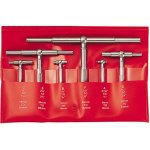"Can any1 break this down in English for me?"
That set should be fine. As I said earlier and Dickie agreed with,as long as the instrument is clean and free from defects,measuring pressure is more important than where the calipers came from. Once you use them enough,you'll almost always exceed what the techincal specs say are the tolerances on accuracy and repeatability.
Trust me on this. The machine shop instructor I had at first made you use dial calipers before you were allowed to even have a set of digitals in your hand,and would often spot-check you on some random object against what he got on his calipers.
His reasoning for this is that such discrepancies can cause problems between co-workers in an actual machine shop environment,and that by developing genuine skill with measuring instruments,you can eliminate a potential source of unwanted bullshit on the job.
Keep in mind,the pressure you want to use on a clearcoated butt or shaftwood is MUCH less than you'd use on aluminum or steel for accurate readings. For this,I tend to use the thicker part on my calipers for measuring shafts. I also rotate the shaft 1/2 turn and re-check.
To be honest though,I use a 0-1" Mitotoyo digital mike (reads to .00005,30 bucks at a pawn shop,matches my calipers),or depending on my mood,a Starrett 0-1" vernier mike my grandfather gave me as much as I use calipers.
I never use the metric functions on any of my digital stuff,as I was drilled in school on being able to do the standard/metric conversion in my head for anything under an inch. I do know,however that there are certain import calipers that will also read out in fractions.
The only cues I've ever really needed to spec out the butt on were my own,and those were only joint,butt cap,and approximate middle of the wrap. Tommy D.
That set should be fine. As I said earlier and Dickie agreed with,as long as the instrument is clean and free from defects,measuring pressure is more important than where the calipers came from. Once you use them enough,you'll almost always exceed what the techincal specs say are the tolerances on accuracy and repeatability.
Trust me on this. The machine shop instructor I had at first made you use dial calipers before you were allowed to even have a set of digitals in your hand,and would often spot-check you on some random object against what he got on his calipers.
His reasoning for this is that such discrepancies can cause problems between co-workers in an actual machine shop environment,and that by developing genuine skill with measuring instruments,you can eliminate a potential source of unwanted bullshit on the job.
Keep in mind,the pressure you want to use on a clearcoated butt or shaftwood is MUCH less than you'd use on aluminum or steel for accurate readings. For this,I tend to use the thicker part on my calipers for measuring shafts. I also rotate the shaft 1/2 turn and re-check.
To be honest though,I use a 0-1" Mitotoyo digital mike (reads to .00005,30 bucks at a pawn shop,matches my calipers),or depending on my mood,a Starrett 0-1" vernier mike my grandfather gave me as much as I use calipers.
I never use the metric functions on any of my digital stuff,as I was drilled in school on being able to do the standard/metric conversion in my head for anything under an inch. I do know,however that there are certain import calipers that will also read out in fractions.
The only cues I've ever really needed to spec out the butt on were my own,and those were only joint,butt cap,and approximate middle of the wrap. Tommy D.
